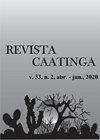Resistance of potato genotypes to late blight
IF 0.9
4区 农林科学
Q3 AGRONOMY
引用次数: 0
Abstract
ABSTRACT Late blight (Phytophthora infestans) is a serious problem in potato crops in southern Brazil due to favorable climatic conditions for the development of the pathogen and the lack of resistant cultivars available in the market. Thus, this study aimed to evaluate the reaction of eight cultivars (Asterix, Catucha, BRS Clara, BRS F63 - Camila, Cristal, BRS F183 - Potira, Markies, and BRS Pérola) and five advanced clones (F05-11-03, F21-07-09, Odone 80-02, F50-08-01, and F63-10-07) to late bight under field conditions. The Agata and the clone CIP392.617-54 were used as susceptible and resistant controls, respectively. The experiments were conducted in the municipality of Pelotas, RS, in the autumn season of 2018 and 2019. Sixty days after planting, the plants were inoculated with the pathogen; and, after one week, the genotypes were evaluated for disease severity and the area under the disease progress curve. ‘Catucha’ was classified as resistant to moderately resistant to P. infestans; ‘Cristal,’ F50-08-01 and ‘BRS Perola’, moderately susceptible to resistant; and ‘BRS F63’ - Camila, F63-10-07, F05-11-03, Asterix, F21-07-09, BRS F183 - Potira, and Odone 80-02, moderately susceptible to susceptible. BRS Clara and Markies showed the greatest variations in both experiments, showing to be susceptible in the autumn of 2018 experiment and moderately resistant in the autumn of 2019 experiment.马铃薯基因型对晚疫病的抗性
晚疫病(疫霉)是巴西南部马铃薯作物的一个严重问题,原因是气候条件有利于病原菌的生长,而市场上缺乏抗疫品种。因此,本研究旨在评价8个品种(Asterix、Catucha、BRS Clara、BRS F63- Camila、Cristal、BRS F183 - Potira、Markies和BRS p罗拉)和5个高级无性系(F05-11-03、F21-07-09、Odone 80-02、F50-08-01和F63-10-07)在田间条件下对晚光的反应。以Agata为敏感对照,CIP392.617-54为抗性对照。实验于2018年和2019年秋季在RS的Pelotas市进行。种植后60 d,接种病原菌;一周后,评估基因型的疾病严重程度和疾病进展曲线下的面积。“Catucha”被归类为对P. infestans具有中等抗性;‘crystal’、‘F50-08-01’和‘BRS Perola’,对抗性有中等敏感性;BRS F63- Camila, F63-10-07, F05-11-03, Asterix, F21-07-09, BRS F183 - Potira, Odone 80-02,中度易感。BRS Clara和Markies在两个实验中表现出最大的变化,在2018年秋季实验中表现出易感,在2019年秋季实验中表现出中等抗性。
本文章由计算机程序翻译,如有差异,请以英文原文为准。
求助全文
约1分钟内获得全文
求助全文
来源期刊

Revista Caatinga
AGRONOMY-
CiteScore
2.10
自引率
11.10%
发文量
67
审稿时长
6-12 weeks
期刊介绍:
A Revista Caatinga é uma publicação científica que apresenta periodicidade trimestral, publicada pela Pró-Reitoria de Pesquisa e Pós-Graduação da Universidade Federal Rural do Semi-Árido – UFERSA, desde 1976.
Objetiva proporcionar à comunidade científica, publicações de alto nível nas áreas de Ciências Agrárias e Recursos Naturais, disponibilizando, integral e gratuitamente, resultados relevantes das pesquisas publicadas.
 求助内容:
求助内容: 应助结果提醒方式:
应助结果提醒方式:


